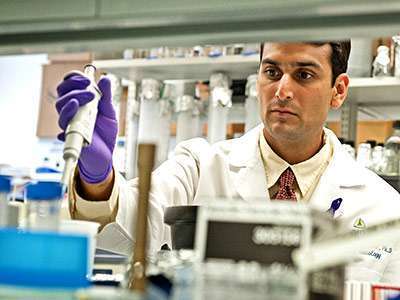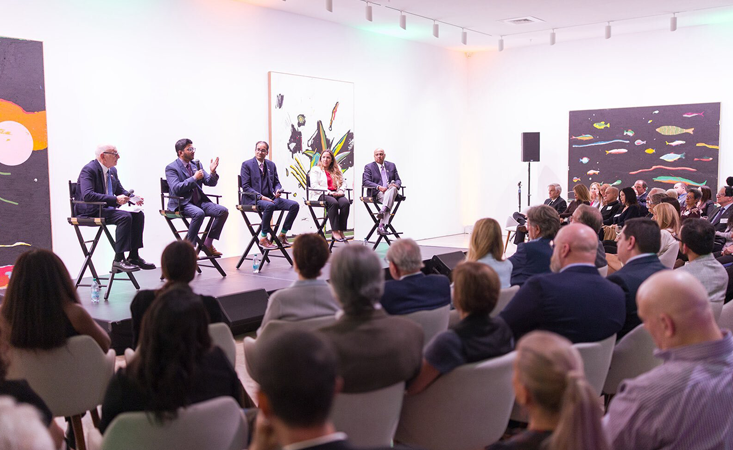
Promising Early-career Scientists Receive Coveted Pancreatic Cancer Research Grants
PHILADELPHIA — The American Association for Cancer Research (AACR) and the Pancreatic Cancer Action Network awarded nine grants to outstanding scientists who will undertake novel research in the field of pancreatic cancer.
“By recruiting the brightest scientists with the most novel ideas, we continue to build a broad research community,” said Julie Fleshman, JD, MBA, president and CEO of the Pancreatic Cancer Action Network. “These award recipients are poised to make significant scientific and clinical discoveries to the field, and we look forward to tracking their progress.”
The Pancreatic Cancer Action Network-AACR joint Research Grants Program was introduced in 2003 and has since awarded over $30 million to support promising scientists and accelerate pancreatic cancer research.
Grant recipients are selected through a competitive peer-review process, and grantees receive professional support as part of the Pancreatic Cancer Action Network’s Community for Progress in conjunction with their funding.
“Early-career investigators are absolutely vital to future progress against all types of cancer,” said Margaret Foti, PhD, MD (hc), chief executive officer of the AACR. “They are the source of many novel, ambitious ideas that move the field forward. The AACR is delighted to continue its partnership with the Pancreatic Cancer Action Network to help fund early-career investigators undertaking innovative projects that have the potential to lead to major breakthroughs that will prevent, detect, and treat pancreatic cancer, one of the most deadly of all cancers.”
Meet the grant recipients and learn more about their funded projects.
The 2016 Pancreatic Cancer Action Network-AACR Pathway to Leadership Grants are grants of up to five years duration totaling $600,000. These grants are designed to support the future leadership of pancreatic cancer research by funding outstanding early-career investigators in a postdoctoral, mentored research position and continuing through successful transition to independence. This year’s recipients are:
- Ethan Abel, PhD, University of Michigan
“The Role and Regulation of HNF1A in Pancreatic Cancer Cells” - Rohit Chandwani, MD, PhD, Memorial Sloan Kettering Cancer Center
“The Epigenetic Plasticity of Pancreatic Adenocarcinoma” - Wantong Yao, MD, PhD, The University of Texas MD Anderson Cancer Center
“Syndecan-1 is a Novel Regulator for Nutrient Salvage Pathway”
Supported in memory of Carina Rogerson
2015 Pancreatic Cancer Action Network-AACR Pathway to Leadership Grant
- Kirsten L. Bryant, PhD, University of North Carolina at Chapel Hill
“Exploiting Pancreatic Cancer Cell Metabolism for Therapeutic Gain”
The 2016 Pancreatic Cancer Action Network-AACR Career Development Awards are two-year grants of $200,000 that are designed to attract and support early-career scientists as they conduct pancreatic cancer research and establish successful career paths in the field. This year’s recipients are:
- Shuibing Chen, PhD, Weill Cornell Medical College
“Targeting Chemoresistant Stem Cells in Pancreatic Cancer” - Kian-Huat Lim, MD, PhD, Washington University School of Medicine, St. Louis
“Deactivating the Innate Immune Defense Mechanism of Pancreatic Cancer”
Supported in honor of Laurie MacCaskill - Rushika M. Perera, PhD, University of California, San Francisco
“Targeting Nutrient Scavenging Pathways That Fuel Pancreatic Cancer Growth”
Supported in memory of Skip Viragh - Amber Simpson, PhD, Memorial Sloan Kettering Cancer Center
“CT Texture Analysis: A Radiomics Approach to Predicting Malignancy in IPMN” - Christopher Vakoc, MD, PhD, Cold Spring Harbor Laboratory
“Enhancer Reprogramming as a Driver of Pancreatic Cancer Progression”
Supported by The Daniel and Janet Mordecai Foundation
More patients will die from pancreatic cancer than breast cancer this year, and the disease is projected to become the second leading cause of cancer-related death in the United States by 2030, according to research conducted by the Pancreatic Cancer Action Network and published in Cancer Research, a journal of the American Association for Cancer Research.
# # #
Follow AACR: Cancer Research Catalyst http://blog.aacr.org; Twitter @AACR; and Facebook http://www.facebook.com/aacr.org
Follow the Pancreatic Cancer Action Network: Twitter @PanCAN and Facebook https://www.facebook.com/pancan
About the American Association for Cancer Research
Founded in 1907, the American Association for Cancer Research (AACR) is the world’s first and largest professional organization dedicated to advancing cancer research and its mission to prevent and cure cancer. AACR membership includes more than 36,000 laboratory, translational, and clinical researchers; population scientists; other health care professionals; and patient advocates residing in 107countries. The AACR marshals the full spectrum of expertise of the cancer community to accelerate progress in the prevention, biology, diagnosis, and treatment of cancer by annually convening more than 30 conferences and educational workshops, the largest of which is the AACR Annual Meeting with nearly 19,500 attendees. In addition, the AACR publishes eight prestigious, peer-reviewed scientific journals and a magazine for cancer survivors, patients, and their caregivers. The AACR funds meritorious research directly as well as in cooperation with numerous cancer organizations. As the Scientific Partner of Stand Up To Cancer, the AACR provides expert peer review, grants administration, and scientific oversight of team science and individual investigator grants in cancer research that have the potential for near-term patient benefit. The AACR actively communicates with legislators and other policymakers about the value of cancer research and related biomedical science in saving lives from cancer. For more information about the AACR, visit www.AACR.org.
About the Pancreatic Cancer Action Network
The Pancreatic Cancer Action Network is the national organization creating hope in a comprehensive way through research, patient support, community outreach and advocacy for a cure. The organization is leading the way to increase survival for people diagnosed with this devastating disease through a bold initiative — The Vision of Progress: Double Pancreatic Cancer Survival by 2020. To continue to accelerate progress, a goal to raise $200 million by 2020 is also in place. Together, we can Wage Hope and rewrite the future of pancreatic cancer. For more information, visit pancan.org.
MEDIA INQUIRIES ONLY CONTACT:
Cara Martinez
Senior Manager, Public Relations
Pancreatic Cancer Action Network
Direct: 310-706-3357
Email: cmartinez@pancan.org
Lauren Riley
American Association for Cancer Research
Direct: 215-446-7155
Email: lauren.riley@aacr.org
ALL OTHER INQUIRIES, PLEASE CALL THE PANCREATIC CANCER ACTION NETWORK AT 877- 272-6226 OR EMAIL INFO@PANCAN.ORG.














